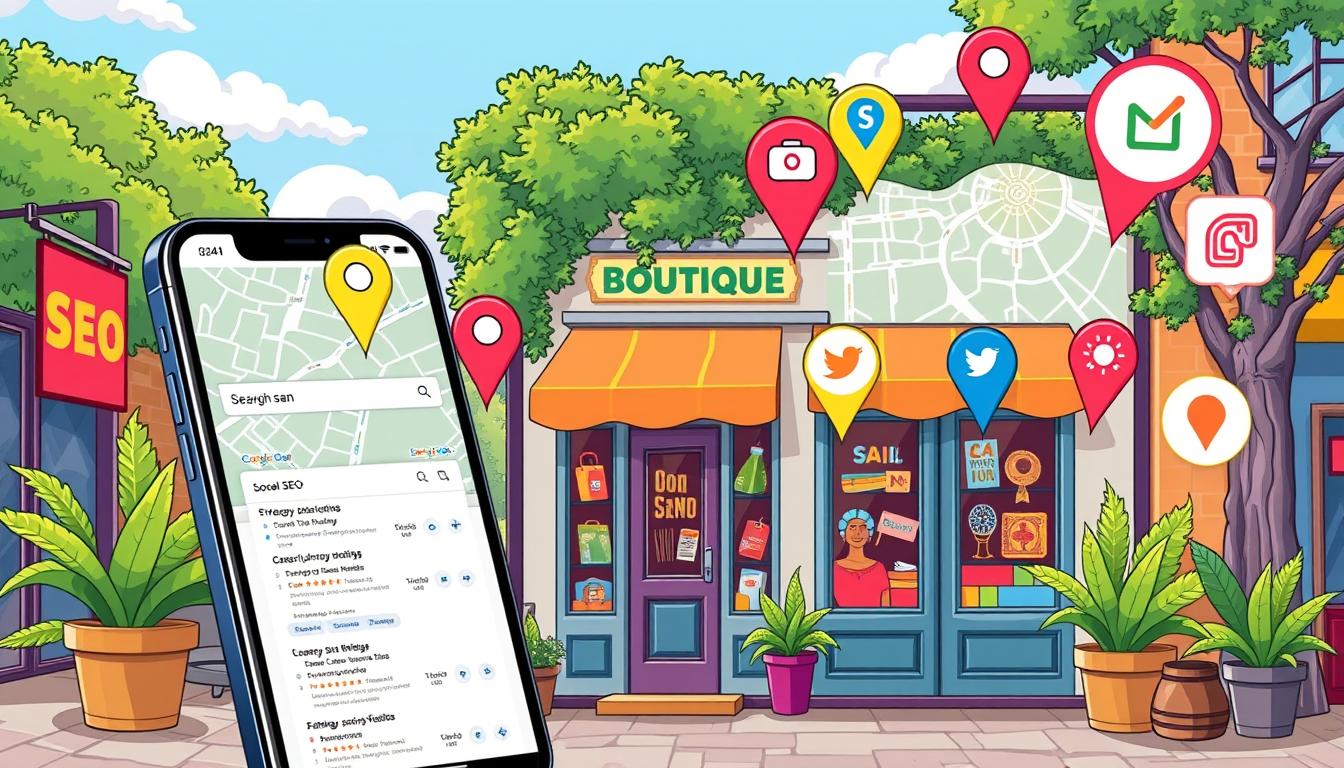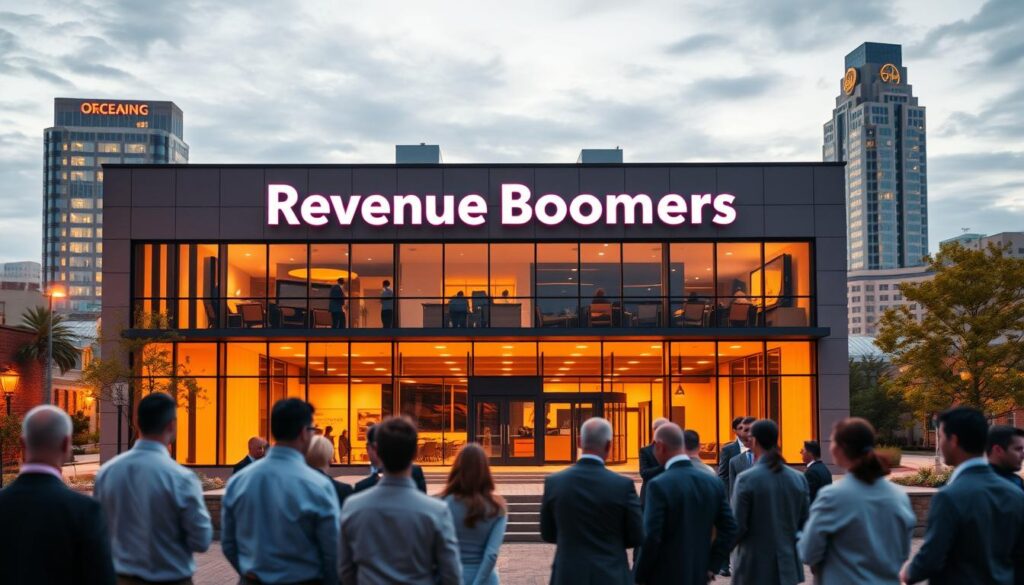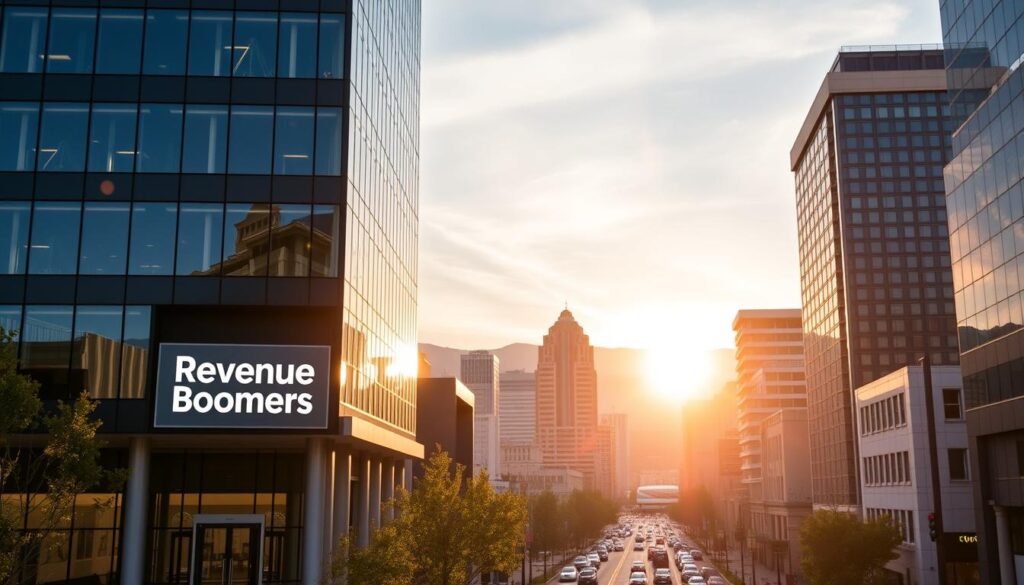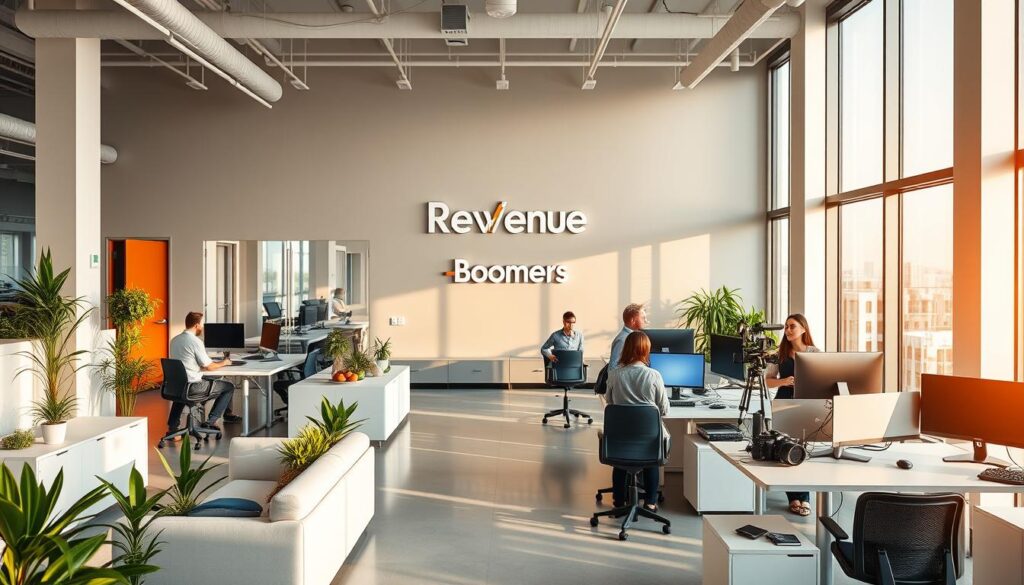Ever wondered why some boutiques get lots of local customers while others don’t? It’s often because they use a good boutique SEO strategy. Knowing What Is Local SEO For Boutiques and using it well can really help your store show up more in local searches. Since many local business owners don’t use local SEO, it’s a great chance for boutiques to stand out in their area.
Local SEO makes your boutique’s online presence better so it shows up in local search results on Google and Google Maps. It not only makes your store more visible but also helps turn online interest into real visits. This is especially important today, when people like to shop both online and in-store.
By understanding how local search engines work, especially how important being close and well-known are, you can draw in more local shoppers. These shoppers want to visit your store in person.
Key Takeaways
- Many local business owners miss out on the benefits of local SEO, allowing those who do optimize to outshine the competition.
- Being active and verified on social media can significantly boost a business’s local SEO prominence.
- Proximity is a key factor in local search rankings, with ‘near me’ queries gaining immense popularity.
- Optimized local businesses often experience increased foot traffic and higher conversion rates.
- Google’s local search rankings hinge on relevance, distance, and prominence to enhance user experience.
For a deeper dive into optimizing your local SEO strategy, check out our resource on SEO for Small Businesses.
Understanding Local SEO and Its Importance for Boutiques
Local SEO is key for boutiques wanting to shine in crowded markets. It makes sure businesses pop up when locals search for nearby products or services. This focus on local customers is vital for shops with physical stores.
Definition of Local SEO
Local SEO helps businesses show up in local searches. For boutiques, this means being seen when people search for “best boutique near me.” Since 81% of people use Google to check out local businesses, local SEO is crucial for boosting sales and attracting customers.
Benefits of Local SEO for Retailers
Using local SEO can really boost a brand’s image and build a loyal customer base. A study shows 76% of people plan to shop more locally soon. With 56% looking for local products, boutiques can grab this interest by ranking well in local searches.
Good online reviews can make a big difference. Half of consumers trust online reviews as much as personal recommendations. Local SEO helps businesses connect with customers who are ready to buy.
Key Differences: Local vs. Traditional SEO
Local SEO focuses on being relevant and close to customers, unlike traditional SEO. This is key for boutiques targeting specific areas. Traditional SEO doesn’t care about location, but local SEO does, helping boutiques compete with big brands in their community.
| Aspect | Local SEO | Traditional SEO |
|---|---|---|
| Focus | Local search visibility | General search visibility |
| Target Audience | Local consumers | Global or broader audience |
| Ranking Factors | Proximity, reviews, NAP consistency | Keywords, links, content quality |
| Search Intent | Local intent (e.g., “near me”) | General information |
Knowing about local SEO is crucial for boutiques to stand out. For more tips on optimizing your online presence, check out this resource on local SEO benefits.
Key Components of Local SEO for Boutiques
Local SEO for boutiques needs several key parts to work well. Knowing these parts helps shops get more online visibility. It also draws in local customers and boosts sales.
Google My Business Optimization
Optimizing your Google My Business profile is key for boutiques. Using this platform well can help you show up in the Google Local Pack. This feature lists the top three businesses in an area.
This visibility makes it easier for people to find your shop. It also lets customers leave reviews and ratings. Google My Business gives insights on how customers interact with your shop, helping you improve your SEO.
Local Keywords and Their Importance
Using local keywords in your website is crucial for better search rankings. These are the terms people use to find boutiques near them. Adding these keywords to your site makes it more visible to local shoppers.
This targeted approach is especially important. Almost half of Google searches are local. For more on local SEO, see this guide on Local SEO for boutiques.
NAP Consistency (Name, Address, Phone Number)
Keeping your Name, Address, and Phone Number the same everywhere is vital. It helps search engines trust your business, which can improve your ranking. A consistent NAP also builds trust with customers, making it easier for them to find and contact you.
This is a key part of effective local SEO. It ensures your business information is accurate and consistent online.
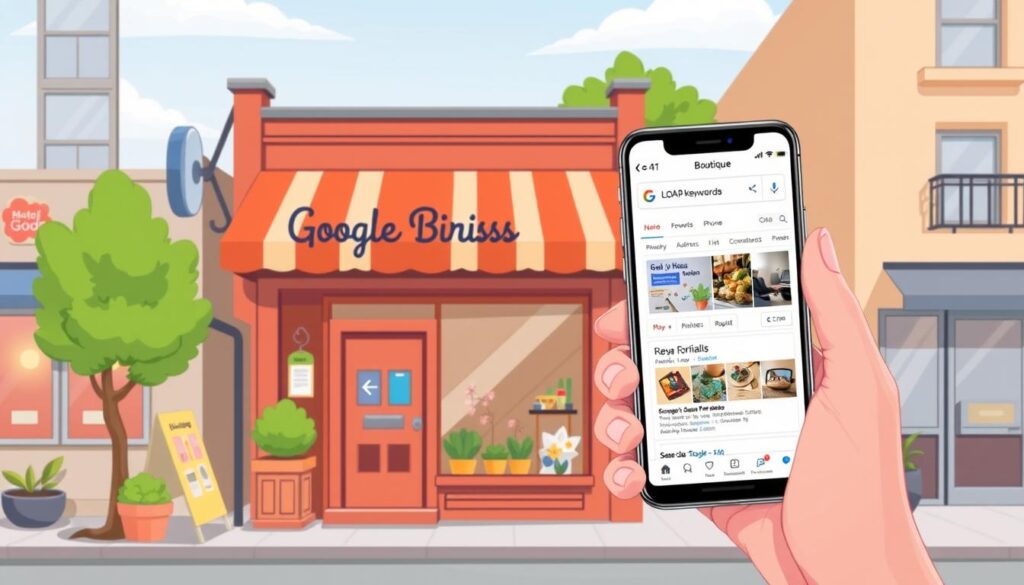
Strategies to Enhance Local SEO for Your Boutique
Improving your boutique’s online presence is key to better local SEO. A good strategy includes optimizing your website, using social media, and managing local citations. Each step helps attract local customers and boosts your search engine ranking.
Optimizing Your Website for Local SEO
A well-optimized website is crucial for a strong boutique SEO strategy. Use location-based keywords in titles, meta descriptions, and content to improve search visibility. Also, focus on website speed and mobile-friendliness to keep visitors happy.
Utilizing Social Media for Local Visibility
Using social media to connect with your local audience can increase your boutique’s online presence. Try neighborhood marketing tactics like geotargeted campaigns and sharing local events. Social media is not just for ads; it’s also for building a community around your brand.
Building Local Citations
Managing local citations well is essential for better local SEO. Getting listed in reputable directories boosts your business’s credibility and visibility. Keep your listings up to date to show you’re reliable. This builds trust and can increase foot traffic and sales.
For a deeper dive into local SEO strategies for businesses, check out this comprehensive guide on optimizing your online presence.
Content Marketing and Local SEO: A Perfect Match
For boutiques wanting to connect with their community, content marketing is key. Using hyper-local content can boost visibility and engagement. Here, we look at key content strategies to improve your local SEO.
Blogging About Local Events and Trends
Blog posts about local events and trends can boost your online presence. Hyper-local content attracts nearby shoppers and strengthens community ties. Informative and engaging blogs keep your audience interested and informed, leading to more store visits.
Engaging with Local Influencers
Collaborating with local influencers can expand your reach. They introduce your boutique to their followers, growing your audience organically. Working with influencers adds credibility and visibility, attracting more customers.
Creating Location-Specific Landing Pages
Location-specific landing pages are vital for local SEO. They should include local keywords, attractions, and other business info. This content improves your search ranking and connects you with the community, making it easier for locals to find you.

| Content Strategy | Description | Benefits |
|---|---|---|
| Blogging | Posts about local events and trends | Increased visibility and community engagement |
| Influencer Collaborations | Partnering with local influencers | Wider reach and enhanced brand reputation |
| Landing Pages | Pages targeting specific neighborhoods | Improved local SEO and community connection |
For more insights on maximizing local SEO effectiveness, explore this in-depth guide.
Tools and Resources for Local SEO
To succeed in local SEO, retailers need to use various tools. These tools help improve visibility and performance in local search results. Understanding and using these tools can greatly impact a boutique’s online presence and customer engagement.
Essential Local SEO Tools to Use
Tools like Google Analytics, SEMrush, and Moz are key for optimizing local SEO. They offer insights into keyword performance, website traffic, and competitor analysis. Google My Business is also crucial for managing your local listing, ensuring accurate and accessible business information.
Analyzing Local SEO Performance
It’s important to regularly analyze local SEO performance for improvement. Monitor KPIs like website traffic, Google My Business interactions, and conversion rates from local searches. Tools specialized in local SEO can help assess these metrics. For more insights, check out Revenue Boomers.
Revenue Boomers: Your Local SEO Partner
For boutiques looking to boost local SEO, partnering with Revenue Boomers can be transformative. They provide tailored services to enhance visibility in local search results. Their expertise in analyzing local SEO performance helps boutiques grow sustainably in the digital landscape.
Common Local SEO Mistakes to Avoid
In the competitive world of local retail, it’s key to know and dodge common local SEO mistakes. With more people using mobiles for local searches, ignoring mobile optimization hurts visibility. Stats show 76% of mobile searchers visit a business the same day, and 28% buy something.
Ignoring Mobile Optimization
In today’s digital world, having a mobile-friendly website is a must. Websites not optimized for mobiles lose a big chunk of potential customers. Making sure your site loads fast and looks good on mobiles is crucial for SEO and keeping users engaged.
Failing to Update Your Google My Business Profile
Another big mistake is not keeping your Google My Business profile up to date. Keeping your hours, offers, and photos current builds trust and boosts SEO. Experts say incomplete profiles miss out on traffic and visits.
Mismanaging Online Reviews and Reputation
Handling online reviews and reputation badly can harm your business. Reviews shape customer choices and affect search rankings. Quick responses to all reviews, good or bad, improve perception and SEO. A strong reputation boosts your visibility in local searches.

